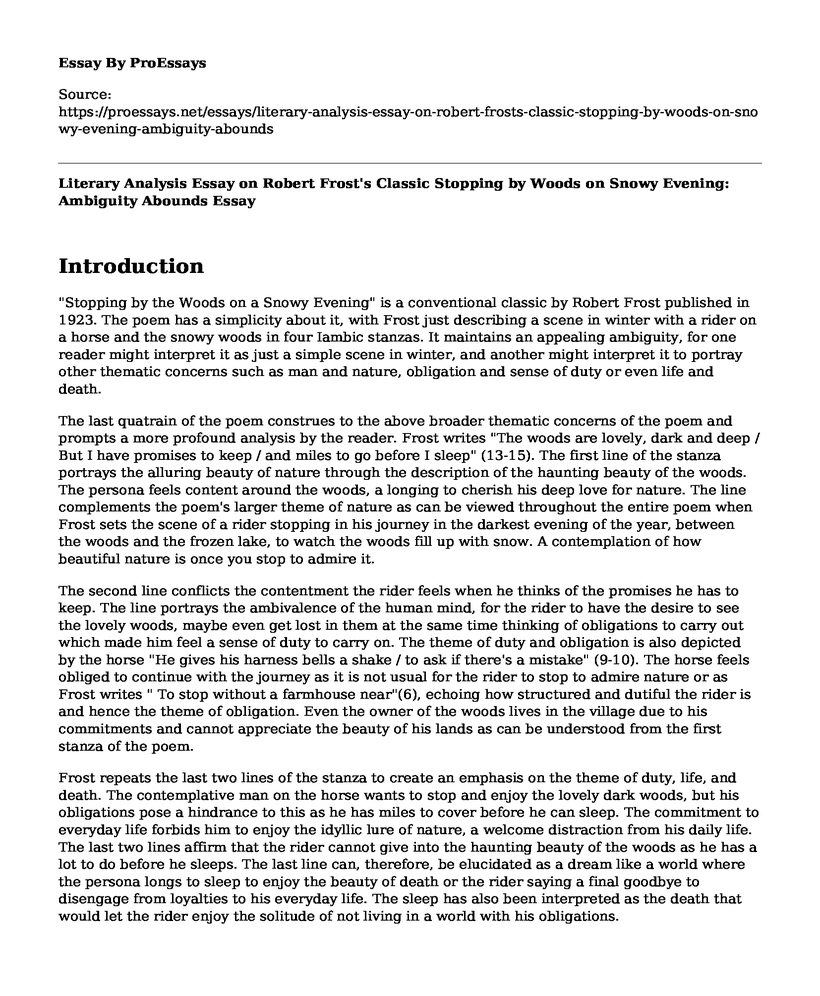Introduction
"Stopping by the Woods on a Snowy Evening" is a conventional classic by Robert Frost published in 1923. The poem has a simplicity about it, with Frost just describing a scene in winter with a rider on a horse and the snowy woods in four Iambic stanzas. It maintains an appealing ambiguity, for one reader might interpret it as just a simple scene in winter, and another might interpret it to portray other thematic concerns such as man and nature, obligation and sense of duty or even life and death.
The last quatrain of the poem construes to the above broader thematic concerns of the poem and prompts a more profound analysis by the reader. Frost writes "The woods are lovely, dark and deep / But I have promises to keep / and miles to go before I sleep" (13-15). The first line of the stanza portrays the alluring beauty of nature through the description of the haunting beauty of the woods. The persona feels content around the woods, a longing to cherish his deep love for nature. The line complements the poem's larger theme of nature as can be viewed throughout the entire poem when Frost sets the scene of a rider stopping in his journey in the darkest evening of the year, between the woods and the frozen lake, to watch the woods fill up with snow. A contemplation of how beautiful nature is once you stop to admire it.
The second line conflicts the contentment the rider feels when he thinks of the promises he has to keep. The line portrays the ambivalence of the human mind, for the rider to have the desire to see the lovely woods, maybe even get lost in them at the same time thinking of obligations to carry out which made him feel a sense of duty to carry on. The theme of duty and obligation is also depicted by the horse "He gives his harness bells a shake / to ask if there's a mistake" (9-10). The horse feels obliged to continue with the journey as it is not usual for the rider to stop to admire nature or as Frost writes " To stop without a farmhouse near"(6), echoing how structured and dutiful the rider is and hence the theme of obligation. Even the owner of the woods lives in the village due to his commitments and cannot appreciate the beauty of his lands as can be understood from the first stanza of the poem.
Frost repeats the last two lines of the stanza to create an emphasis on the theme of duty, life, and death. The contemplative man on the horse wants to stop and enjoy the lovely dark woods, but his obligations pose a hindrance to this as he has miles to cover before he can sleep. The commitment to everyday life forbids him to enjoy the idyllic lure of nature, a welcome distraction from his daily life. The last two lines affirm that the rider cannot give into the haunting beauty of the woods as he has a lot to do before he sleeps. The last line can, therefore, be elucidated as a dream like a world where the persona longs to sleep to enjoy the beauty of death or the rider saying a final goodbye to disengage from loyalties to his everyday life. The sleep has also been interpreted as the death that would let the rider enjoy the solitude of not living in a world with his obligations.
Conclusion
Robert Frost's Poem "Stopping by the woods on a Snowy Evening" reaffirms the beauty of nature, the desire for solitude and portrays how obligations, duty, and ambivalence of man forbid him from enjoying the beauty of nature. The poem creates a memorable impression of the overwhelming presence of nature and how man's desire to admire it but allowing a sense of duty to be a hindrance can make one not appreciate what is right in front of them, a conflict of two minds.
Work Cited
Frost, Robert. Stopping by Woods on a Snowy Evening. E. Helene Sherman, 1970. https://sites.google.com/site/jtferko/LP2.doc 218-239. Accessed on 28th June 2019
Cite this page
Literary Analysis Essay on Robert Frost's Classic Stopping by Woods on Snowy Evening: Ambiguity Abounds. (2023, Jan 24). Retrieved from https://proessays.net/essays/literary-analysis-essay-on-robert-frosts-classic-stopping-by-woods-on-snowy-evening-ambiguity-abounds
If you are the original author of this essay and no longer wish to have it published on the ProEssays website, please click below to request its removal:
- A Literary Essay Sample: Allusions in Hamlet
- The Purple Hibiscus - Literary Analysis Essay
- The Symbolism of Color in Sir Gawain and the Green Knight Essay
- Essay Sample on Rufus Weylin: A Crucial Role in Kindred by Octavia Butler
- Essay Sample on Robert Frost's Stopping by Woods on a Snowy Evening: Symbols, Imagery, and Analysis
- Essay on Unlock Your Full Potential: 3 Keys to Unlock Success With Daniel H. Pink
- Essay Example on 3 Poem Types: Theme, Form, Figurative Language







